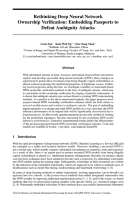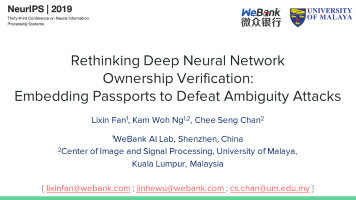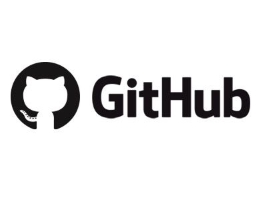DeepIPR
This is the code repo of our NeurIPS2019 work that proposes novel passport-based DNN ownership verification schemes, i.e. we embed passport layer into various deep learning architectures (e.g. AlexNet, ResNet) for Intellectual Property Right (IPR) protection.
Deep Learning Intellectual Property Right Protection (DeepIPR)
Rethinking Deep Neural Network Ownership Verification: Embedding Passports to Defeat Ambiguity Attacks
Authors:
- Lixin Fan1 (lixinfan@webank.com)
- Kam Woh Ng1,2 (jinhewu@webank.com)
- Chee Seng Chan2 (cs.chan@um.edu.my)
Webank AI Lab1, University of Malaya2
Thirty-third Conference on Neural Information Processing Systems (NeurIPS 2019)
Abstract
With substantial amount of time, resources and human (team) efforts invested to explore and develop successful deep neural networks (DNN), there emerges an urgent need to protect these inventions from being illegally copied, redistributed, or abused without respecting the intellectual properties of legitimate owners. Following recent progresses along this line, we investigate a number of watermark-based DNN ownership verification methods in the face of ambiguity attacks, which aim to cast doubts on the ownership verification by forging counterfeit watermarks. It is shown that ambiguity attacks pose serious threats to existing DNN watermarking methods. As remedies to the above-mentioned loophole, this paper proposes novel passport-based DNN ownership verification schemes which are both robust to network modifications and resilient to ambiguity attacks. The gist of embedding digital passports is to design and train DNN models in a way such that, the DNN inference performance of an original task will be significantly deteriorated due to forged passports. In other words, genuine passports are not only verified by looking for the predefined signatures, but also reasserted by the unyielding DNN model inference performances. Extensive experimental results justify the effectiveness of the proposed passport-based DNN ownership verification schemes. Code is available at https://github.com/kamwoh/DeepIPR
Materials
Paper
Powerpoint Slide
Poster
Code
Citation
@inproceedings{Deepassport,
title={Rethinking Deep Neural Network Ownership Verification: Embedding Passports to Defeat Ambiguity Attacks},
author={Fan, Lixin, Ng, Kam Woh and Chan, Chee Seng},
booktitle={Advances in Neural Information Processing Systems (NeurIPS)},
year={2019},
}



